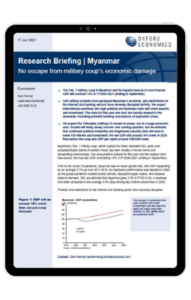No escape from Myanmar military coup’s economic damage

Myanmar’s Feb. 1 military coup, which ousted the newly reelected NDL party over unsubstantiated claims of election fraud, has been deadly in human terms and devastating economically. Our once-positive outlook for this year and the medium term has soured. We now see GDP contracting 13% in FY2020-2021 (ending in September).
What you will learn:
- The Feb. 1 military coup in Myanmar and its impacts lead us to now forecast GDP will contract 13% in FY2020-2021 (ending in September).
- Anti-military protests have paralyzed Myanmar’s economy, and restrictions on the internet and banking sectors have severely disrupted activity. We expect international sanctions and high political and business risks will crush exports and investment. The risks for this year and next are heavily skewed to the downside, including potential banking and balance-of-payments crises.
- We expect the Tatmadaw (military) to remain in power, but at a huge economic cost. Growth will likely slowly recover over coming quarters, but we estimate that continued political instability and heightened security risks will lead to lower FDI inflows and investment. We see GDP still around 18% lower in 2025 than before the coup and GDP per capita around US$1000 lower.
Tags:
Related Services

Post
APAC Key Themes 2026: Paybacks, policy offsets and trade
We believe APAC will remain the strongest global performer in 2026. However, the growth trajectory will likely be more uneven than in past cycles.
Find Out More
Post
Japan’s fiscal policy will remain loose, which increases risks to debt sustainabilit
We've changed our fiscal outlook for Japan in our December forecast round. We now expect the new government to set a primary deficit close to that of 2024, at 2%-3% of GDP for 2025-2027, instead of restoring a balanced budget by taking advantage of strong tax revenue. We assume higher bond yields will force the government to take measures to reduce the deficit from 2028.
Find Out More